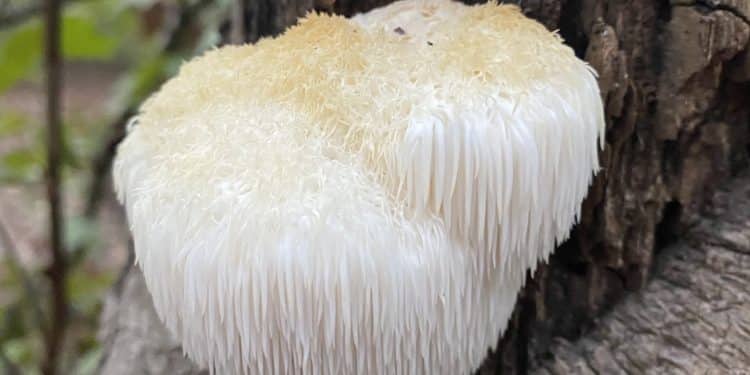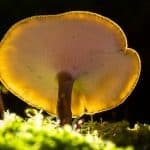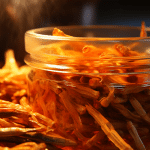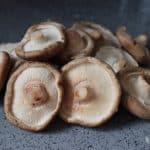Does Lion’s Mane Promote Neurogenesis?
In addition to many other benefits, lion’s mane appears to help with neural growth, also known as neurogenesis, possibly even healing damaged nerve cells. We have reviewed dozens of clinical trials in order to gain a deeper understanding of the mechanisms behind the neuro-protective and neurogenic properties of lion’s mane.
Although only few studies on lion’s mane effect on neurogenesis have been done on humans, the studies that are available indicate that this mushroom has potent neurotrophic properties. A 2021 study examined the effects of four compounds found in lion’s mane mushroom on brain health, with results suggesting that the mushroom shows a high potential for improving memory via lion’s mane helping to form new neurons.
This mechanism could be the basis for the claims of lion’s mane having neurogenic benefits.
Neurogenesis, the process by which new neurons are formed in the brain, can exert antidepressant effects. One study examined the effects of lion’s mane neurogenesis properties on depression in animals. The results showed that it has an antidepressant effect, because it decreases inflammation in the brain and helps the production of new nerve cells.
Does Lion’s Mane Reverse Brain Damage?
Brain cell damage may occur due to oxidative stress, inflammation, stroke, and a variety of other factors. Several studies have shown the potential of lion’s mane mushrooms to help with neural regeneration and the recovery of neurological injuries. One animal study examined the effects of Hericium erinaceus on brain damage caused by an ischaemic stroke. Researchers gave rats suffering from ischemic strokes aqueous extracts of Hericium erinaceus. The rats who received the extract showed significant improvement in their brain damage, as compared with the rats that did not.
So while these are just animal studies, it does appear that lion’s mane can help heal and reverse brain damage.
Does Lion’s Mane Mushroom Promote Nerve Growth?
Yes, lion’s mane mushroom does promote nerve growth, according to studies.
Clinical studies have shown that one of the properties of the lion’s mane mushroom is the ability to stimulate neural growth factor (NGF, for short) proteins. These proteins help with growth and the proper development of nerve cells.
An in vitro study investigated the effects of Hericium erinaceus on NGF-mediated neurite growth. The study specifically examined the effects of Hericienone K, finding the compound to be an inhibitor of NGF protein production. This, in turn, promoted overgrowth of the neurites (a critical process for the differentiation of neurons). Based on the results described above, it appears that Hericium erinaceus mushrooms certainly promote neurogenesis, at least in animals.
According to these findings, lion’s mane mushroom does indeed promote nerve growth.
Human studies (such as the study of the effects of Hericium erinaceus on mild cognitive decline in Japanese adults) have shown promise, but the evidence base is not strong enough to definitively claim that manes promote neural regeneration in humans. The animal studies data are stronger in favor of lions mane stimulating brain regeneration, including growth of new neurons. Human studies on lion’s mane effects on neurogenesis are scant. The ones that do exist point to positive correlations between consumption of lions mane and improved cognitive performance (which suggests neurogenesis). More studies are needed to definitively prove that lions mane helps the human brain to grow new nerve cells.
Given the lack of downside of eating lion’s mane, and given its relatively low cost and wide availability, it might make sense, on the basis of the existing evidence, to supplement the diet with lions mane as an additional, alternative medicine to induce neurogenesis.
You can find our favorite capsules, powders, and tincture’s on the following pages of our website and learn more about each individually:
Our Favorite Lion’s Mane Supplements
Our Favorite Lion’s Mane Powders
Our Favorite Lion’s Mane Tinctures
Our Favorite Lion’s Mane Gummies
Further Background
Lion’s Mane Mushroom, is a fungus goes by a lot of names. Commonly found throughout Europe, North America, and Asia, the medicinal mushroom has been used for some time in ancient Chinese medicine.
It feeds on the decaying remains of trees, or rather, on organic material found within tree bark called detritus. Adaptogenic mushrooms, however, can also feed off live trees, in which case they will kill the tree after years of living on them like parasites.
Benefits
Research into lion’s mane health benefits indicates that this mushroom has considerable potential for neurogenesis, prevention, and restoration of neural damage, and the relief of dementia, symptoms of depression and anxiety, and neuropathic pain, among other neurological health properties. In addition to its numerous other benefits, lions mane appears to support neural growth, possibly even the repair of damaged nerve cells. We have reviewed dozens of clinical trials in order to gain a deeper understanding of the mechanisms behind the neuroprotective and neurogenic properties of lions mane.
Lion’s Mane Vitamins and Minerals
Lions Mane Mushrooms provide lots of vitamins, including thiamin, biotin, niacin, folate, and vitamin B6.
Does Lion’s Mane Cross the Blood-Brain Barrier?
Yes, compounds from lion’s mane can cross the blood-brain barrier. The blood-brain barrier serves a crucial function, shielding sensitive brain tissues from toxin carried by blood. While protecting your brain from toxins, the blood-brain barrier also keeps out a lot of good stuff. However, hericenone and erinacine, bioactive compounds found in fruiting bodies of many functional mushrooms, including Lions Mane, can easily pass through the blood-brain barrier. These beneficial compounds stimulate neural growth factors (NGFs), which may offer a variety of benefits, including protection against brain injuries, regeneration of neurons (neurogenesis), and myelination.
Additional Resources:
Lion’s Mane Spiritual Benefits
Updated 10/11/2022















